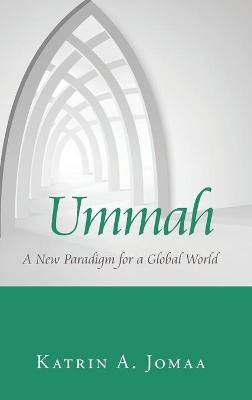
Ummah
State University of New York Press (Verlag)
978-1-4384-8205-7 (ISBN)
How can we live together without alienation, avoidance, and fear? How can we complement one another such that each of us can uniquely contribute to the making of our societies? To address these and other questions, Katrin A. Jomaa examines the moral, political, and spiritual understanding of the Qur'anic term ummah, which is commonly used to refer to the worldwide Muslim community but is employed more broadly in the Qur'an itself. Drawing on theology, history, philosophy, and political science, Jomaa argues that ummah, while often defined as a group of people united by ethnicity or religion, is, in its ideal sense, a community that demands active commitment and a conscious and continuous dedication to the highest moral ideals of that community rather than mere affiliation with a particular set of religious doctrines and practices. Jomaa begins by chronologically and thematically analyzing the word "ummah" in the Qur'an, a comprehensive study currently missing from Islamic scholarship, in order to propose a novel understanding of the term that connects all its different meanings. She then compares this new definition to the Aristotelean polis, which highlights the political features of ummah, thereby situating it within contemporary discourses on liberal politics and community and creating the space for an alternative sociopolitical order to the nation-state, both as a local unit and a global system.
Katrin A. Jomaa is Assistant Professor of Islam and Politics at the University of Rhode Island.
List of Illustrations
Acknowledgments
Introduction
1. Conceptual Meaning of Ummah in the Meccan Verses of the Qur'ān
Ummah in the Literature
Analysis of the word ummah in the Meccan verses of the Qur'ān
Ummah, Appointed Term (ajal), and Associated Responsibility
Ummah, Religion, and Forefathers
Ummah and al-Kitāb
Ummah and Imām
Ummah and the Covenant (al-Mīthāq)
A Possible Order of a Global Ummah Composed of Different Umam?
Ummah, Ummī Prophet, and the Global Ummah
Ummah and Sovereignty
Leadership, the Book, and Justice
Land (Territory)
Ummah and Nation-State
Al-Ummah al-Wāḥidah and Its Differentiation across Human History
Ummah of the Prophets
Dealing with Religious Diversity
Confederates of Evil (al-Aḥzāb)
The Reformers (Muṣliḥūn)
Conclusion
2. Ummah in the Medinan Verses of the Qur'ān
The Notion of a Shared Ummah: Rights and Obligations
Prophet Abraham (Ibrāhīm) Was an Ummah
Defining the Ideology and Outlook of the Muslim Ummah through Prophet Abraham
The Best Religion (Dīn) is Following Millat Ibrāhīm "al-Ḥanīf "
Al-Manāsik (the Rituals)
The Middle Ummah (al-Ummah al-Wasaṭ) and the Witness (Shahāda)
Ummah from Ahl Al-Kitāb ( Jews and Christians)
The Best Ummah (Khayr Ummah) Ever Raised Up for Humankind
Ummah of the Book and Governance
Conclusion
3. Ummah in the Medina Constitution
Al-Muʾminūn ("The Believers")
Decrees Addressing the Believers
Decrees Addressing the Jews
Decrees Addressing Ahl as-Ṣaḥīfah (the People of the Constitution)
Sacred Land (ḥaram)
Conclusion
4. The Ummah and Political Governance—Comparative
The Ummah and the Aristotelian Polis
Khalīfa and Political Animal
Khalīfa
Khalīfa in Early, Classical, and Modern Exegesis
Khilāfa in Islamic Literature
Aristotelian Polis and Qur'anic Ummah
Polis and Ummah: Medium Whereby Citizens Exercise Virtuous Activity
Difference between Law and SharīʿahRule of Law (Polis and Ummah)
Resolving Conflict by Invoking Competing Virtues in Aristotle and the Qur'ān
Community and State in Contemporary Political Theory
Polis and Constitution versus Ummah and al-Kitāb
Introducing Reforms through the Constitution
The Characters of Constitution and the Citizen Mirror Each Other
Constitutional Law Transformed into Community Norm
Polis and Justice versus Ummah and Wasaṭiyyah
Justice as a "Mean" and the Concept of "Wasaṭ"
Understanding "Prophet Abraham Was an Ummah" through Aristotle's "Unity of Virtues"
Ummah Attains Justice through Shūra (Collective Judgment of Khulafāʿ)
Justice Is Manifested in the"Common Good" Resulting from Collective Judgment
Ummah and Political Power
The Just Leadership versus Ṭāghūt
ʾUlū 'l-amr (Those Entrusted with Authority)
ʾUlū 'l-amr in the Medina Constitution
ʾUlū 'l-amr in the Modern Period
Concluding Remarks
Appendix
Bibliography
Index
Index of Qur'anic Citations
| Erscheinungsdatum | 13.09.2021 |
|---|---|
| Zusatzinfo | Total Illustrations: 6 |
| Verlagsort | Albany, NY |
| Sprache | englisch |
| Maße | 152 x 229 mm |
| Gewicht | 227 g |
| Themenwelt | Geschichte ► Teilgebiete der Geschichte ► Religionsgeschichte |
| Geisteswissenschaften ► Religion / Theologie ► Islam | |
| ISBN-10 | 1-4384-8205-1 / 1438482051 |
| ISBN-13 | 978-1-4384-8205-7 / 9781438482057 |
| Zustand | Neuware |
| Haben Sie eine Frage zum Produkt? |
aus dem Bereich


